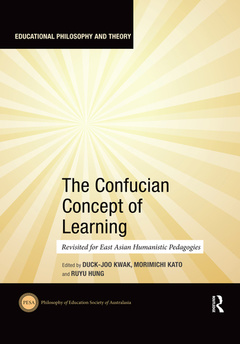The Confucian Concept of Learning Revisited for East Asian Humanistic Pedagogies Educational Philosophy and Theory Series
Coordonnateurs : Kwak Duck-Joo, Kato Morimichi, Hung Ruyu

What does the Confucian heritage mean to modern East Asian education today? Is it invalid and outdated, or an irreplaceable cultural resource for an alternative approach to education? And to what extent can we recover the humanistic elements of the Confucian tradition of education for use in world education?
Written from a comparative perspective, this book attempts to collectively explore these pivotal questions in search of future directions in education. In East Asian countries like China, Japan, Korea and Taiwan, Confucianism as a philosophy of learning is still deeply embedded in the ways people think of and practice education in their everyday life, even if their official language puts on the Western scientific mode. It discusses how Confucian concepts including rite, rote-learning and conformity to authority can be differently understood for the post-liberal and post-metaphysical culture of education today. The contributors seek to make sense of East Asian experiences of modern education, and to find a way to make Confucian philosophy of education compatible with the Western idea of liberal education.
This book was originally published as a special issue of Educational Philosophy and Theory.
Introduction: The Confucian Concept of Learning Revisited for East Asian Humanistic Pedagogies1. Ethics of Learning and Self-knowledge: Two cases in the Socratic and Confucian teachings2. Humanistic Traditions, East and West: Convergence and divergence3. ‘‘The Source of Learning is Thought’’ Reading the Chin-ssu lu with a ‘‘Western Eye’’4. A Theory of Learning in Confucian Perspective5. The Corporeality of Learning: Confucian Education in Early Modern Japan6. Lixue, the Lost Art: Confucianism as a form of cultivation of mind7. A Critique of Confucian Learning: On Learners and Knowledge8. Two Concerns of the Confucian Learner9. Modern Versus Tradition: Are there two different approaches to reading of the Confucian classics?
Duck-Joo Kwak is Professor of Philosophy of Education at Seoul National University, Korea. She is the author of Education for Self-transformation: Essay as an Educational Practice (2011) and numerous articles on values education and teacher education.
Morimichi Kato is Professor of Philosophy of the Faculty of Human Sciences at Sophia University, Japan. He has a long-standing interest in the history of Platonism and humanism in the West, and has written extensively on Plato, Aristotle, Cicero, Renaissance philosophers, Heidegger, Charles Taylor and Gianni Vattimo.
Ruyu Hung is Professor of Philosophy of Education at National Chiayi University, Taiwan. She is the author of Leaning Nature (2010), Education between Speech and Writing: Crossing the Boundaries of Dao and Deconstruction (2017) and many other philosophical and educational articles.
Date de parution : 05-2020
17.4x24.6 cm
Disponible chez l'éditeur (délai d'approvisionnement : 14 jours).
Prix indicatif 48,88 €
Ajouter au panierDate de parution : 05-2018
17.4x24.6 cm
Disponible chez l'éditeur (délai d'approvisionnement : 14 jours).
Prix indicatif 160,25 €
Ajouter au panierThèmes de The Confucian Concept of Learning :
Mots-clés :
Young Man; Educational Philosophy and Theory; Zhuzi Yulei; humanistic pedagogies; Song Ming Confucian; humanism; Troubled Practice; contemporary education; Kaibara Ekiken; modernity; Jeong Yak Yong; educational philosophy; Ogyu Sorai; ethics of learning; Zhu Xi; Confucianism; Confucian Learning; Morimichi Kato; Korean Confucianism; Ruyu Hung; Moral Principles; Roland Reichenbach; Self-ruling Man; Chung-ying Cheng; Confucian Texts; Masashi Tsujimoto; Li Ji; Hyong-Jo Han; Zhu Xi Philosophy; Youn-Ho Park; Existential Approach; Chung-yi Cheng; Ce Yin; Civil Service Examination; Confucian Knowledge; Western Humanistic Traditions; Xue Ji; Confucian Classics; Confucian Teaching; Socratic Teaching; Classical Chinese Language



